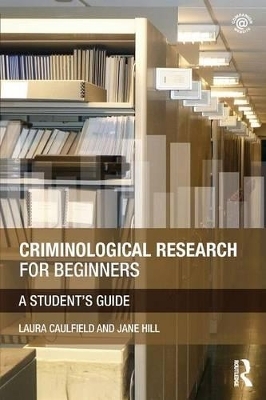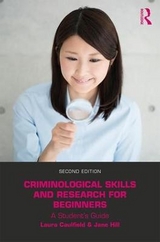
Criminological Research for Beginners
Routledge (Verlag)
978-0-415-50961-9 (ISBN)
- Titel erscheint in neuer Auflage
- Artikel merken
It is common for Criminology undergraduates to feel intimidated at the prospect of conducting their own research, and these students typically struggle to see the relevance of research methods to their own studies. This book speaks directly to the needs of such students, and includes contemporary examples and case studies that bring a topic that is often thought of as dry to life, providing a thorough and accessible practical guide that students can return to at each stage of their research, all the way through to their dissertation.
This book covers:
an examination of the theoretical, political, and ethical debates in criminological research;
a complete guide to planning criminological research, assisting student researchers in identifying their research questions, choosing their research methods, and critiquing the available literature;
guidance on the practicalities and processes of collecting data,
a discussion of the process of analysing data and writing up research,
Including an extensive glossary and an integrated companion website with extra examples, exercises, and videos to further develop students’ understanding, this book is essential reading for any undergraduate on a Criminological Research Methods course, or for anyone in need of practical guidance on any or every of the various stages involved in conducting thorough and effective criminological research.
Laura Caulfield PhD is Head of Research and Consultancy in the School of Society, Enterprise and Environment at Bath Spa University. She conducts research and lectures in the areas of criminal justice, criminal psychology, and research methods. She is an expert in the evaluation of programmes for those involved in the criminal justice system and her work is currently focused on assessing the impact of the arts and other non-traditional programmes. In 2011 Laura was presented with a commendation award from the Howard League for Penal Reform for her research on the arts in prisons. Jane Hill PhD has had a career in teaching Sociology and Criminology at under-graduate and post-graduate levels. She was Programme Director of BA Criminology at BCU when she retired in 2012. Jane has always had an interest in research methods and the philosophy of science. Her research has been in the areas of Child Protection, Community Justice and Restorative Justice.
Part One: The Importance of Criminological Research, 1. Context: power, knowledge, and politics, 2. Significance: the importance of criminological research, 3. Ethics in criminological research, Part Two, Getting Going with Criminological Research, 4. Planning: Where do research ideas come from?, 5. Critiquing the literature: What do we know already?, 6. The relationship between theories and methods, 7. Preparing for the practical challenges of real-world crime research, Part Three, Doing Criminological Research: Data Collection, 8. Conducting interviews and focus groups, 9. Ethnography, case studies, and life-history approaches, 10. Questionnaires and surveys, 11. Using secondary data sources, Part Four, Doing Criminological Research: Analysis and writing-up, 12. Analysing the data: Quantitative analysis, 13. Analysing the data: Qualitative analysis, 14. Analysing the data: Documents, images, and other data, 15. Writing-up criminological research.
| Zusatzinfo | 12 Line drawings, black and white; 27 Halftones, black and white; 13 Tables, black and white; 39 Illustrations, black and white |
|---|---|
| Verlagsort | London |
| Sprache | englisch |
| Maße | 156 x 234 mm |
| Gewicht | 431 g |
| Themenwelt | Schulbuch / Wörterbuch ► Lexikon / Chroniken |
| Recht / Steuern ► EU / Internationales Recht | |
| Recht / Steuern ► Strafrecht ► Kriminologie | |
| ISBN-10 | 0-415-50961-0 / 0415509610 |
| ISBN-13 | 978-0-415-50961-9 / 9780415509619 |
| Zustand | Neuware |
| Informationen gemäß Produktsicherheitsverordnung (GPSR) | |
| Haben Sie eine Frage zum Produkt? |
aus dem Bereich



